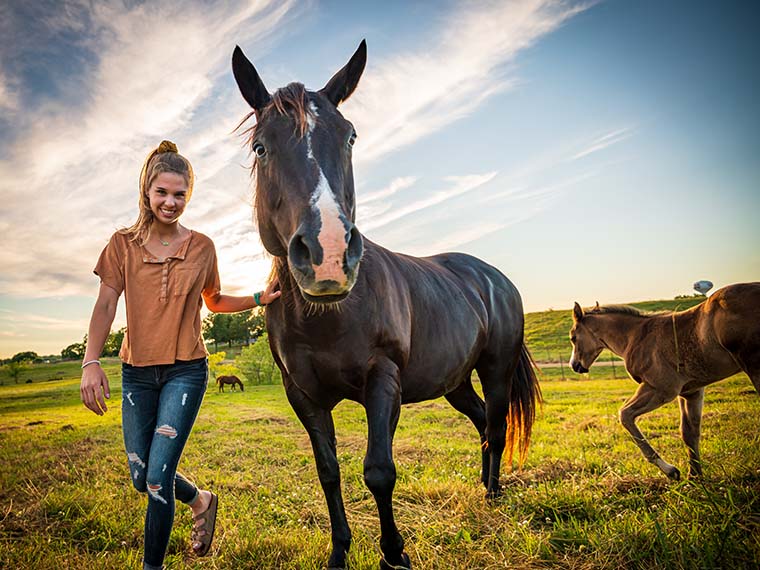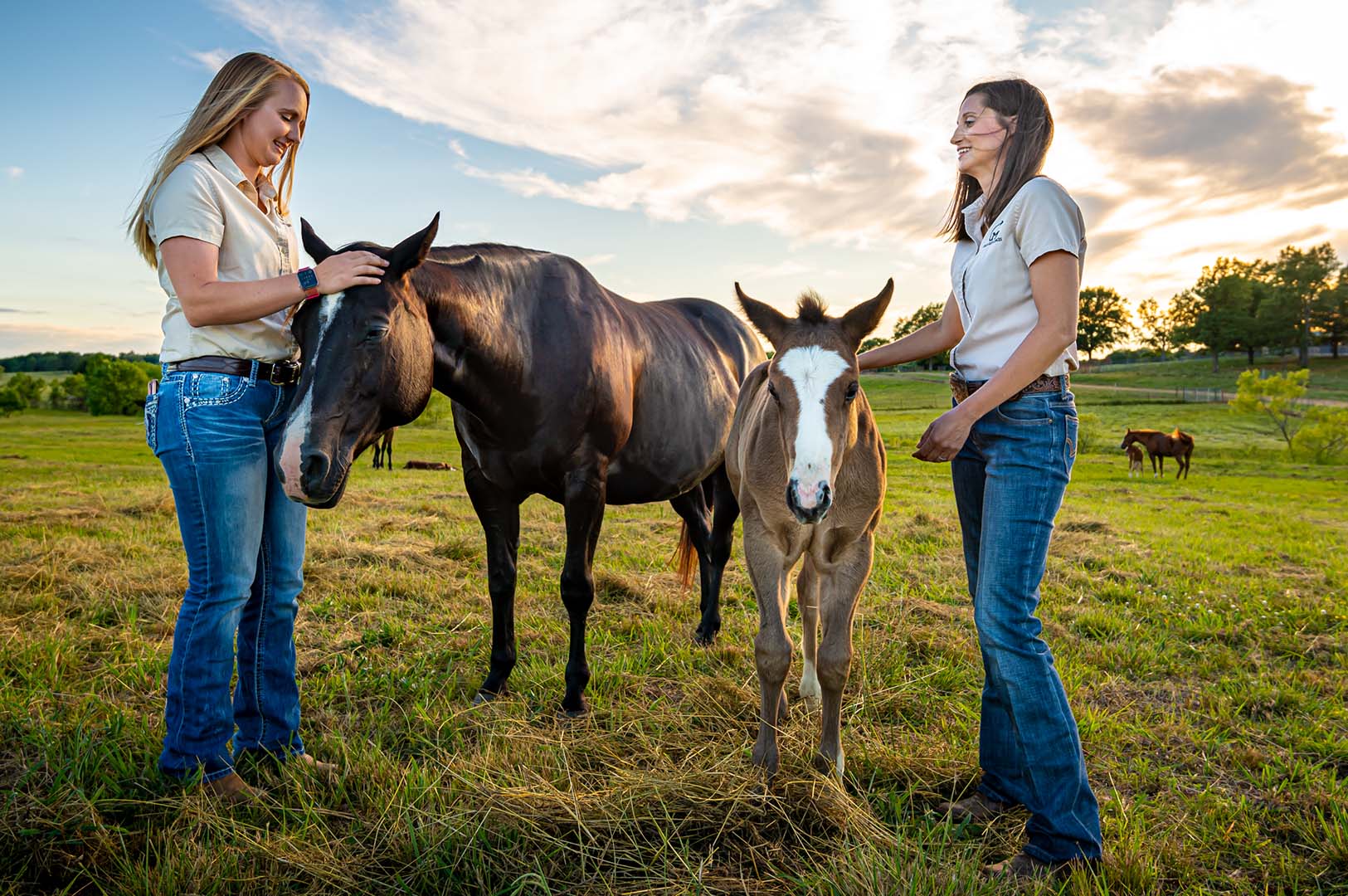The information presented on this page may be dated. It may refer to situations which have changed or people who are no longer affiliated with the university. It is archived as part of Mississippi State University's history.
Weighing around 1,000 pounds, the horse is graceful, riding with its mane full blown in the wind, hoofs pounding on the ground, muscles flexing with the sun reflecting off its smooth coat. It is a gentle giant, an animal some love, some fear, and some find courage and peace in its noble shadow.
For Dr. Molly Nicodemus, horses became a lifeline, when she needed it the most. As an animal and dairy sciences associate professor, horses are now an integral part of her career.
The Texas native was diagnosed with type 1 diabetes when she was eight. At the time, the diagnosis felt like a death sentence, until it revealed her passion. In her hometown of Houston, she had access to many tools and programs, including therapeutic horseback riding.
"Shortly after my diagnosis, my mother enrolled me in the summer Texas Lions Camp in Kerrville, one of a few camps in the nation, at that time, to offer an equine therapy program," Nicodemus said. "During the course of that program, I fell in love with horses. I didn't know it was for therapy, I didn't know anything but that I loved horses."
The rest of her life would follow that passion. Aside from teaching multiple equine-based courses at Mississippi State, Nicodemus is on the frontline of multiple research studies in equine therapy. Currently, she is working to better understand the impact volunteering in equine-assisted activities and therapy programs has on the confidence and knowledge in college students.
By definition, equine-assisted activities are any specific activity involving the interaction between a horse and participant, including therapeutic riding. For this study, students are hands-on with therapeutic riding programs and labs. Students complete a survey at the beginning and end of the course to gauge equine knowledge, skill level, confidence, and opinions of equine-assisted activities and therapy programs.
"We're really seeing something happen with the students volunteering that is more than scholarly attainment. Yes, they're learning, but they're also becoming more confident at a level you don't usually get in the classroom," Nicodemus said.
She continued, "With students that volunteer for the therapy program, they evolve and change over the semester because of the interaction with the horses and connection with patients. It just seems to be a bridging system we have never seen before between a volunteer and patient."
Nicodemus believes this submersion into the program is really what changes the students, as it seems to open their eyes while simultaneously breaking down barriers. The true credit, Nicodemus strongly believes, goes to the horse.
"Horses are such nurturing animals that allow for that unconditional and non-judgmental love, opening up the barriers we as humans tend to create," Nicodemus states. "The horse creates a unique opportunity because of how large they are. They give an empowerment you just cannot simulate."
Healing College Students
Despite growing up around horses in Tupelo, Katie Cagle-Holtcamp, a doctoral student in animal physiology, did not know her future would be working with equine-assisted therapy when she first entered MSU. One month prior to starting college, Cagle-Holtcamp volunteered with the therapeutic riding program at the summer camp she had been attending for a decade.
"That was my first experience with therapeutic riding, and I fell in love with it. I realized that was what I wanted to do, I wanted to be a therapeutic riding instructor," Cagle-Holtcamp said.
In August of 2017, Cagle-Holtcamp joined the Oxford Treatment Center in Etta, Mississippi as an equine therapist working with patients recovering from drug and alcohol addiction. Her experience with the Oxford Treatment Center and therapeutic riding opened the door to conduct research with Nicodemus.
Cagle-Holtcamp and Nicodemus are currently studying the relationship between the development of equine knowledge and feelings of emotional safety in college students enrolled in animal science courses. The term "emotional safety" is something Cagle-Holtcamp actually coined herself after working with at-risk youths in a similar study.
The study looked at animal science students divided into four categories based on course enrollment type: general animal science courses, equine laboratory courses only, equine lecture courses only, and equine lecture/laboratory courses. Over the duration of the semester, the students were given three survey-style tests-at the beginning, middle, and end-with questions based on horsemanship and emotional safety.
Results indicated that student's emotional safety and equine knowledge improved when comparing beginning surveys to end surveys, regardless of the course enrollment type. Cagle-Holtcamp also noticed participants described an increase in four main themes: respect, connectivity, comfort, and confidence/self-worth.
Her findings with college students were not as significant as those with the patients in the treatment center. While connectivity and comfort were the most profound improvements in the college students, those at the center show an increase in every category. Cagle-Holtcamp strongly believes the defining factor is the difference in conversation.
"At the Oxford Treatment Center, we get six weeks to change their minds or their course, to ultimately prolong their life. Though we hope for long term recovery for each client, addiction reality drives us to get to the point quickly," Cagle-Holtcamp said. "We have very intentional conversations while doing the exact same thing the students did, but we get to the heart of the matter faster. That's the difference-same activity, different conversation."
Similar to Nicodemus's thoughts on the horse being the star in equine-assisted activities and therapy programs on the confidence and knowledge in college students, Cagle-Holtcamp acknowledges that the horse plays a large role in outcomes, however, she also considers the horse's role as a facilitator.
"When the horse interacts with a very direct purpose, there's something that happens that you cannot quantify. You cannot put it into words, but it's healing," Cagle-Holtcamp states. "What I'm trying to show, though, is it takes more than just petting a horse to impact therapy, and we need to move into that realm."
Cagle-Holtcamp sees opportunity for the conversation to change with college students' involvement in equine-therapy programs. Half of college students battle depression or anxiety according to an American College Health Association survey.
"Mental health issues can be a stigma, but they don't have to be because we all feel anxious and unsure at times," Cagle-Holtcamp said. "We have found, through research, that equine-assisted programs and therapies allow students to open up and be honest about their feelings and in so doing it boosts their confidence to tackle the next challenge."
Leading factor or facilitator, the interaction with the horse is at the center of equine-assisted activities and therapy programs, steadying troubled teens and anxious students alike. As students engage in equine programs, they develop confidence and knowledge to help lead similar programs for others.
The research is funded by the Mississippi Agricultural and Forestry Experiment Station. Community partners include the Oxford Treatment Center in Etta, Mississippi.
We're really seeing something happen with the students volunteering that is more than scholarly attainment. Yes, they're learning, but they're also becoming more confident at a level you don't usually get in the classroom.
Dr. Molly Nicodemus


